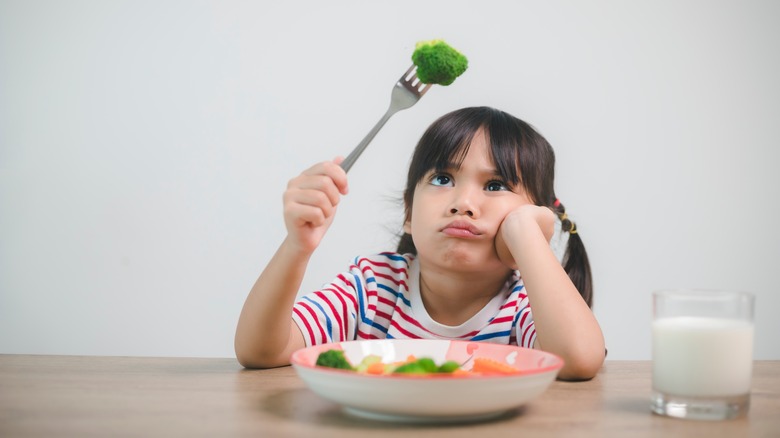Is It Safe For Kids To Follow The Keto Diet?
If you're a regular consumer of media, you've probably heard of the keto diet, more formally known as the ketogenic diet. The Farmers' Almanac notes that the first recorded "diet" came to be in 1893, and it shared many principles with modern ketogenic diets. Interestingly, the ketogenic diet was initially adopted by Russel Wilder in 1921 as a method to treat epilepsy, as reported by a 2022 article published in StatPearls. Eventually, it became a diet applied by many, not just patients with epilepsy.
When implementing a ketogenic diet, an individual will generally avoid foods that are high in carbohydrates such as bread, pasta, potatoes, and sweets, according to Diet Doctor. They will instead choose to eat low-carb foods like meat, fish, vegetables, eggs, nuts, and berries. The keto diet attracts people because of its potential for facilitating weight loss.
According to Healthline, weight loss happens because the keto diet reduces carbohydrate consumption and substitutes the missing carbohydrates with fat, promoting ketosis. Ketosis occurs when the body is lacking glucose, or blood sugar, which is normally what stimulates the production of energy in cells. The body then uses stored fat as a replacement energy source once ketones accumulate in the blood (per Healthline).
Although the ketogenic diet might sound appealing in theory, you may be wondering whether this type of diet is actually safe to put into practice. We will look into whether the keto diet is safe for adults and, if so, is it safe for children.
The pros and cons of the keto diet
As we learn about how the ketogenic diet affects the body, it's essential that we discuss how safe it is. Like most things in life, it seems that the keto diet has both its pros and cons. According to the Mayo Clinic, the keto diet has decreased the frequency of seizures for approximately half of young people with epilepsy. There has also been evidence that supports the relationship between the keto diet and weight loss, and people generally report feeling less hungry on the diet when compared to other restrictive diets, Dr. Melinda Ring tells Northwestern Medicine.
As mentioned by Healthline, individuals with an increased risk of disordered eating should refrain from trying this diet, as it can be restrictive and may intensify unhealthy eating behaviors. Keeping food intake under close observation can result in psychological stress, binge eating, and feelings of guilt, notes Northwestern Medicine.
There can be short-term side effects of the keto diet, such as headaches, dehydration, fatigue, and bad breath, which usually subside within a few weeks. As pointed out by the Mayo Clinic, the keto diet may appear to work in the short term, but it's not known how it impacts long-term health. For these reasons, if you're considering the ketogenic diet or any other diet, it's crucial to first discuss your options with a healthcare professional.
With so many adults being intrigued by the keto diet, it's understandable to wonder if the diet is safe for children.
Is the keto diet safe for children?
In general, it turns out that it's safer for children not to partake in the ketogenic diet. Some children with epilepsy do try the keto diet as a treatment option for their seizures, particularly if they don't respond well to medication or are not eligible for surgery, as reported by the Children's Hospital of Philadelphia. However, Dr. Melissa Fossier explains to Children's Health that a metabolic state of ketosis makes your body shift into "starvation mode" so it uses fat as your body's backup energy source.
Because the keto diet limits carbohydrate intake, it's especially disadvantageous to children. At their current developmental stage, children need carbohydrates for their bodies to grow and for them to have enough mental and physical energy for schoolwork and play. According to the Cleveland Clinic, following the keto diet would also deprive children of the vitamin D and calcium found in dairy, and the dietary fiber, vitamin C, and potassium found in fruits.
Due to a lack of fiber, children may also experience constipation from following the keto diet. In a 2005 study published in Epilepsy Currents, the keto diet was most commonly associated with dehydration and gastrointestinal disturbances such as nausea, vomiting, diarrhea, and constipation in the child participants.
As opposed to the keto diet, Dr. Fossier recommends encouraging children to be physically active, eat nutritious meals while limiting processed foods and sugar, and not fixate on the number on a scale (per Children's Health).



